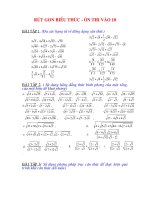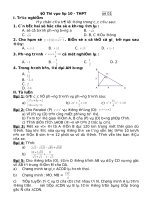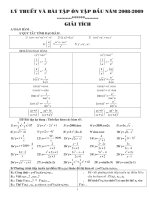On thi vao 10: Reading comprehension
Bạn đang xem bản rút gọn của tài liệu. Xem và tải ngay bản đầy đủ của tài liệu tại đây (48.97 KB, 4 trang )
Reading comprehension
Exercise 1: Read the passage and then choose the best answer A, B, C or D.
Planet earth is a system of planets and their moons, as well as numerous asteroids and
comets which …(1)… around a huge star we call the Sun. The Sun itself …(2)… of gas. Nuclear
reactions inside its core …(3)… the heat and light that makes life on the Earth …(4)… The Earth
is the third of the four small terrestrial (Earth-like) planets that orbit close to the …(5)… .
Further out in our Solar System are four huge gas planets, while distant Pluto,
…(6)… planet, is made …(7)… rock and ice. Our Earth is one of the ten planets that orbit the
Sun-a huge, burning- hot star in the centre of our Solar System. The Solar System and all the
stars in the …(8)… are part of our galaxy …(9)… millions more galaxies. They…(10)… all added
together to make up the Universe.
1. A. run B. orbit C. turn D. walk
2. A. consists B. remains C. includes D. maintains
3. A. produce B. product C. productionD. productive
4. A. able B. possibility C. possible D. ability
5. A. Earth B. Mars C. Mercury D. Sun
6. A. the smaller B. smallest
C. the most smallest D. the smallest
7. A. from B. of C. for D. in
8. A. space B. universe C. Moon D. sky
9. A. consists B. makes from C. stays D. contains
10. A. is B. are C. to be D. get
Exercise 2: Read the passage and then choose the best answer A, B, C or D.
For many young people, sport is a …(1)…part of school life and being in one of the
school teams and playing in matches is very important. If …(2)… is in a team, it means a lot of
extra …(3)… and often spending a Saturday or Sunday away from home…(4)…many matches
are played then. It…(5)…also involve traveling to other towns to play …(6)… other school teams
and then …(7)… on after the match for a meal or a drink. Sometimes, parents, friends or …(8)…
students will travel with the team to support their …(9)…side.
When a school team…(10)… another one, it is the whole school that…(11)… proud, not
only the players. It can also mean that a school …(12)… well-known for being good at certain
sports.
1. A. famous B. popular C. well-known D. smart
2. A. anyone B. someone C. everyone D. no one
3. A. study B. matching C. game D. training
4. A. as B. so C. so that D. although
5. A. ought B. should C. must D. could
6. A. for B. with C. against D. versus
7. A. being B. staying C. leaving D. spending
8. A. other B. another C. others D. the other
9. A. part B. self C. own D. whose
10. A. victories B. wins C. beats D. loses
11. A. feels B. comes C. turns D. gets
12. A. turns B. makes C. comes D. becomes
Exercise 3: Read the passage and then choose the best answer A, B, C or D.
There is now …(1)… concern about the world’s energy…(2)…, particularly about those
concerning …(3)… fuels. In less than a hundred years we shall probably …(4)… all the …(5)…
sources of oil and gas. The world’s coal…(6)… should last longer but, once used these can not
be renewed. It’s important…(7)…that we should develop such alternative sources of energy as
water and wind power …(8)… as renewable energy. Until these supplies are…(9)…used, it is
important for the developed countries to reduce…(10)… as much as possible.
1. A. risen B. increasing C. raising D. arising
2. A. sources B. properties C. assets D. resources
3. A. fossil B. soil C. earth D. ground
4. A. get rid of B. exhaust C. spend D. complete
5. A. current B. now C. present D. momentum
6. A. reservoir B. conservation C. preservation D. reserve
7. A. however B. therefore C. yet D. consequent
8. A. called B. put C. classified D. thought
9. A. widely B. long C. widespread D. greatly
10. A. usage B. using C. waste D. consumption
Exercise 4:. Read the passage and then choose the best answer A, B, C or D.
More than 300.000.000 people speak English as their …(1)… language. Another 300.000
speak it as a …(2)… language. No one knows how many people speak it as a(n) ….(3)….
Language. Chinese is the only …(4)… with more speakers than English. This is because of the
huge population of (5)…, more than one billion people. More people study English than any …
(6)…. language. English is …(7)…language of aviation, commerce, and education. …(8)… to
English, a lot of people from the third…(9)… have chances to change their lives. Despite the
appearance of Esperanto, which used to be thought the world official language, English is still
the most…(10)… language.
1. A. one B. first C. important D. minor
2. A. second B. two C. secondary D. official
3. A. abroad B. aboard C. foreign D. national
4. A. tongue B. linguistics C. language D. voice
5. A. Chinese B. China C. Beijing D. Great Wall
6. A. another B. others C. other D. ordered
7. A. an B. a C. the D. one
8. A. Due B. Thanks C. Since D. As
9. A. Country B. World C. Space D. Earth
10. A. nation B. national C. international D. global
Exercise 5: Read the passage and then choose the best answer A, B, C or D.
Over the past forty years, TV sets have become standard pieces of equipment in…(1)…
and watching TV has become a standard activity for many families. Children in our culture
grow up…(2)… TV in the morning, in the afternoon and often in the evening as well. …(3)…,
there are many excellent programs for children, many people think that TV may not be good
for them.
…(4)… TV may be a bad influence…(5)… children for three main reasons. …(6)… come
programs aren’t good for children to see. For example, there are many police stories on TV:
people are killed…(7)… guns, knives and even poisons. Some children might think these things
could …(8)… to them at any time. …(9)… they can become …(10)… .
1. A. each of home B. all of homes C. most homes D.almost homes
2. A. to watch B. seeing C. watching D. and watch
3. A. Despite B. Yet C. Although D. But
4. A. So that B. Though C. In additionD. In fact
5. A. on B. to C. of D. about
6. A. The first B. Firstly of all C. After all D. First of all
7. A. by B. of C. with D. used
8. A. be B. take place C. happen D. work
9. A. After all B. Therefore C. But D. Whereas
10. A. fearfull B. frightened C. frightening D. fearlessness
Exercise 6: Read the passage and then choose the best answer A, B, C or D.
Where, when and how languages began is still…(1)… mystery. Many people think…(2)…
language grew from human beings …(3)… animal sounds and that they learned to use these
sounds to communicate with each …(4)… . Probably the language of …(5)…people consisted …
(5)… a complicated system of sounds. However, we can only trace the history of languages to
the time …(7)…they were first written and by then they …(8)…well developed.
1. A. an B. a C. the D. one
2. A. if B. whether C. that D. so
3. A. trying B. imitating C. speaking D. listening
4. A. another B. other C. others D. ones
5. A. ancient B. primary C. primitive D. old
6. A. for B. of C. on D. to
7. A. where B. when C. that D. which
8. A. seem B. were C. was D. are
Exercise7: Read the passage and then choose the best answer A, B, C or D.
Rice is …(1)…by Vietnamese people everyday. It often…(2)…in tropical countries such
as Vietnam, Thailand, or Malaysia. The Chinese have also been growing rice for …(3)…of
years. The seeds are planted in special beds to grow into young rice…(4)… . Then they are
taken to fields covered with myddy water called…(5)… . The fields of rice look very beautiful.
After 3 or 5 months, the rice is ready to be…(6)… . People often drain away water before
collecting rice. Eating rice is a special action in the world. They do not use spoons or folks to
enjoy bowls of rice, …(7)…they use two short sticks…(8)…as chopsticks to put rice into their
mouths. Japan, Koreas, China, and Vietnam are the four countries where people use chopsticks
very well.
1. A. eaten B. drunken C. used D. cut
2. A. plants B. grows C. raises D. keeps
3. A. thousand B. hundred C. thousands D. million
4. A. plants B. trees C. species D. kinds
5. A. lakes B. ponds C. paddies D. soils
6. A. selected B. picked C. chosen D. held
7. A. Besides B. But C. Instead D. And
8. A. called B. known C. seen D. watched
Exercise 8: Read the passage and then choose the best answer A, B, C or D.
The problem of …(1)…or energy always causes serious matters, even leads to wars.
Let’s look out our windows. During the day, the …(2)…gives out light and heat energy. At
night, our streets and houses become colorful with electric lamps. …(3)…gasoline, our cars
could not even …(4)… . Everything needs energy. Energy can be found in a …(5)…of different
forms. However, gasoline is …(6)…important form. Due to gasoline, many Arabic…(7)…such as
Kuweit, Quatar, or Iran become richer. There used to be wars so as to control gasoline…(8)… .
1. A. oil B. gasoline C. power D. control
2. A. moon B. sun C. stars D. sky
3. A. Unless B. If not C. Without D. but
4. A. run B. star C. begin D. move
5. A. lots B. number C. amount D. digit
6. A. the best B. the better C. the more D. the most
7. A. cities B. areas C. countries D. worlds
8. A. shops B. resources C. supplies D. places
Exercise 9:. Read the passage and then choose the best answer A, B, C or D.
One of the most serious problems …(1)…human life is the dirtying and poisoning of air
and water. It is the pollution of our environment.
Air pollution …(2)…when wastes are poured into the atmosphere and air becomes
contaminated and unpleasant to …(3)… . We depend …(4)…life on the air we breathe. As the air
becomes more …(5)…more polluted, hazards to health increase. Today we have industrial air
pollutants from factories and mills and engine-exhaust fumes. That’s …(6)…some large cities
have to ban cars from the city center to wipe out smoke and limit the emission of poisonous
gases and dangerous chemicals from industrial smoke stacks in …(7)…to clean the air in our
living environment as much as…(8)… .
1. A. threatening B. threatened C. threatens D. threaten
2. A. occurs B. exits C. appears D. becomes
3. A. breath B. breathing C. breathe D. breaths
4. A. on B. for C. at D. but
5. A. or B. so C. and D. as
6. A. what B. how C. why D. who
7. A. order B. as C. so D. but
8. A. well B. long C. possible D. able.
Exercise 10: Read the passage and answer with true (T), false (F) or not given (N).
On 8 August 1967, five leaders - the Foreign Ministers of Indonesia, Malaysia, the
Philippines, Singapore and Thailand - sat down together in the main hall of the Department od
Foreign Affairs building in Bangkok, Thailand and signed a document. By virture of that
document, the Association of Southeast Asian Nations (ASEAN) was born. The five Foreign
Ministers who signed it - Adam Malik of Indonesia, Narciso R. Ramos of the Phillipines,
Thanat Khoman of Thailand - would subsequently be hailed as the Founding Fathers of probaly
the most successful inter-govermental organization in the developing world today. And the
document that they signed would be known as the ASEAN Declaration. Nowadays ASEAN
consists of countries.
1. ASEAN was born in Thailand.
2. Ten countries formed ASEAN.
3. Five P.Ms signed the ASEAN Declaration.
4. There are five countries in ASEAN nowadays.
5. Thailand is the most powerful country in ASEAN.
6. The countries forming ASEAN are called the Founding Fathers.
Exercise 11: Read the passage and answer with true(T), false(F) or not given(N).
The zipper is a wonderful invention. They are very common so we forget that they are
wonderful. They are strong but they open and close very easily. They come in many colors and
sizes. In the 1810s people in the US wore high shoes or clothes with a long row of buttons. It
was hard for them to wear anything. They wanted an easier way to put on and take off clothes.
Whitcomb Judson invented the first zipper in 1839. He called it a slide fastener.
A zipper has three parts. There are dozens of metal or plastic teeth in two rows. These
are fastened to two flexible strips of cloth. A fastener slides along and fastens the teeth
together. When it slides the other way, it takes the teeth apart.
1. Using zipper is a difficult way to wear something.
2. A zipper hardly closes and opens.
3. The first zipper was made in 1810.
4. Zippers can be made of plastic or metal.
5. Each zipper consists of three parts.
6. Zippers are often expensive.
Exercise 12: Read the passage and answer with true (T), false (F) or not given (N).
Every year many people in the world learn Engish. Some of them are very young
children. Others are teenagers. Many are adults. Some learn at school, others learn at evening
classes. A few learn English by themselves or just by hearing the language on TV or among
their friends. Most people must work hard to learn English.
Why do all these people want to learn English? It is difficult to answer that question.
Young children learn English at school because it is one of their subjects. Many adults learn
English for their higher studies because some`of the books are in English at college or
university. Other people learn English because they want to read newspapers or magazines in
English.
1. Adults cannot study English.
2. English is easy for most language learners.
3. English is compulsory for children at school.
4. English is necessary for adults’ work.
5. Students sometimes to read books in English.
6. We can easily know why many people learn English.
Exercise 13: Read the passage and answer with true (T), false (F) or not given (N).
The Richter scale is a numerical logarithmic scale developed and introduced by Charles
R. Richter in 1935 to measure the amplitude of the largest trace recorded by a standard
seismograph one hundred kilometers from the epicenter of an earthquake. Tables have been
formulated to demonstrate the magnitude of any earthquake from any seismograph. For
example, for a one- unit increase in magnitude, there is an increase of thirty times in released
energy. The Richter scale considers earthquakes of 6.75 as great and 7.0 to 7.75 as major. An
earthquake that reads 4 to 5.5 would be expected to cause localized damage, and those of
magnitude 2 may be left. It is estimated that almost one million earthquakes occur each year,
but most of them are so minor that they pass unnoticed.
1. What does this passage mainly discuss?
A. Earthquakes B. The Richter scale
C. Charles R. Richter D. Seismography
2. In what kind of textbook would this passage most likely be found?
A. History B. Biography C. Geology D. Mathemetics
3. According to information in the passage, what does the Richter scale record?
A.The distance from the epicenter
B. The amplitude of the largest trace
C. The degree of damage
D. The location of the epicenter
4. What is the value of the tables?
A.They allow us to interpret the magnitude of earthquakes
B. They help us to calculate our distance from earthquakes
C. They record all earthquakes
D. They release the energy of earthquakes
5. According to the Richter scale, which of the following numbers would indicate that there
had probably been damage to the immediate area only?
A. 7.0 B. 6.0 C. 5.0 D. 2.0









